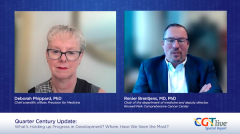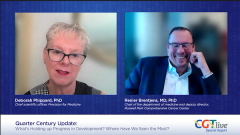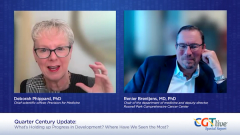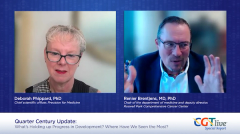
Quarter Century Update: The Impact of Artificial Intelligence
Deborah Phippard, PhD, and Renier Brentjens, MD, PhD, discussed how AI will affect cell and gene therapy research and practice.
Episodes in this series

The past 25 years, from 2000 to 2025, have been an unprecedented and rapid period of development of the field of cell and gene therapy. A number of critical breakthroughs have occurred in this time, and the technologies have gone from preclinical musings to realities of standard clinical practice, at least in a few key indications like hematologic malignancies and neuromuscular disease. To get a perspective on how far we've come, and how far we have yet to go, CGTLive® reached out to Deborah Phippard, PhD, the chief scientific officer of Precision for Medicine, and Renier Brentjens, MD, PhD, the chair of the department of medicine and the deputy director at Roswell Park Comprehensive Cancer Center, to hold a Special Report discussion on the topic entitled: "Quarter Century Update: What’s Holding up Progress in Development? Where Have We Seen the Most?"
In this final episode of the Special Report, Brentjens and Phippard discuss the emerging and hard to predict role of artificial intelligence (AI) in advancing cell and gene therapies. Brentjens noted that while few truly understand AI, it is already proving valuable in areas like designing molecular binders and analyzing massive biological datasets—work that could transform how scientists identify tumor targets and engineer therapies. He described AI’s potential to rapidly generate new solutions in fields such as neoantigen discovery, tumor microenvironment analysis, and in vivo delivery design, calling it both exciting and disorienting. Phippard agreed, highlighting AI’s expanding role in patient identification, disease phenotyping, and treatment matching, especially as cancers are better understood through complex genomic and molecular data. She emphasized AI’s potential to personalize therapy selection, improve patient access, and support hospitals in safely managing advanced treatments like chimeric antigen receptor T-cell (CAR-T) therapy. Together, they envisioned AI as a driving force that will redefine how diseases are understood and treated—ushering in what Brentjens called “Star Trek–type technologies.”
Newsletter
Stay at the forefront of cutting-edge science with CGT—your direct line to expert insights, breakthrough data, and real-time coverage of the latest advancements in cell and gene therapy.






















